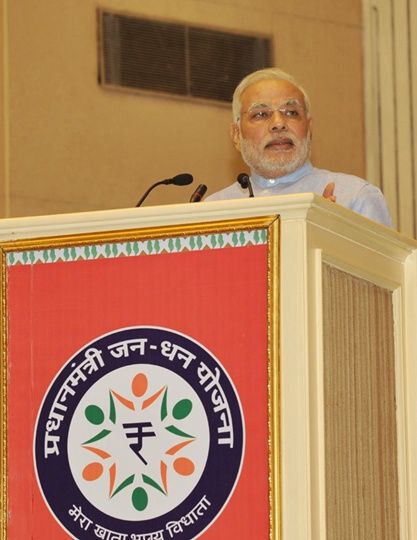Bankers also say that since other schemes like the Pradhan Mantri Suraksha Bima Yojana, Pradhan Mantri Jeevan Jyoti Bima Yojana and Atal Pension Yojana are linked with Jan Dhan accounts, their success will depend on how the loopholes in the Jan Dhan accounts are plugged.
 Paramjit Kaur, a resident of Salempur village in Punjab's Ludhiana district, can barely hide her excitement when asked about the Jan Dhan scheme launched last year.
Paramjit Kaur, a resident of Salempur village in Punjab's Ludhiana district, can barely hide her excitement when asked about the Jan Dhan scheme launched last year.
She was one of the first women from her village to open what she calls the "zero balance" account. And she is one of the lucky few to have a passbook.
The entries, all in English, show her as a student (she is actually a home maker) and that she has not made a single transaction since the account was opened on August 28, 2014.
Her father's name is given in the column for wife and the nomination column says "not registered". All the people this reporter spoke to in the village had opened "zero balance" accounts.
Few of them received passbooks. None has received a RuPay card yet. They were not aware of the benefits of the scheme and did not know about the conditions to claim them.
But he, too, has not made a single transaction and is yet to receive the RuPay card, making him and others like him ineligible for the overdraft facility and accident and life insurance benefits that come with these accounts.
According to the details of the scheme, an account holder becomes eligible for an overdraft of up to Rs 5,000 only after satisfactory operation of the account for six months and the RuPay card that comes with the account has an inbuilt accident insurance cover of Rs 100,000.
According to government data, 179 million accounts were opened under the scheme till August 26, 2015. However, only "10 lakh (one million) accounts have been found eligible for overdraft.
Out of these, the overdraft facility has been availed by 164,962 account holders." The sense one gets after talking to a number of bankers is the scheme, though laudable in its objective, is suffering because of procedural complexities.
"Since most of these accounts were opened in a great hurry and at organised camps, many entries need to be checked and rechecked.
The feedback I receive is that entries, at least in 60-70 per cent cases, with regard to nomination just do not exist.
In such a scenario, how can insurance claims be settled?" asked a middle-level banker with a leading public sector bank posted in Ludhiana.
Bankers say the reason so few account holders are eligible for overdraft is many of them have not strictly followed the know-your-client (KYC) norms. Non-existence of mandatory transactions within 45 days of the opening of the account is another reason.
"We sent RuPay cards to addresses given by the customers. A majority of them came back to us as those addresses just do not exist.
It is a huge problem for us," a Delhi-based banker with another government-owned bank told this reporter.
Bankers also say that since other schemes like the Pradhan Mantri Suraksha Bima Yojana, Pradhan Mantri Jeevan Jyoti Bima Yojana and Atal Pension Yojana are linked with Jan Dhan accounts, their success will depend on how the loopholes in the Jan Dhan accounts are plugged. "Suppose the premium for any of these schemes is to be deducted from the Jan Dhan account.
If there is no transaction and hence no balance, how will the premium be deducted?" observed another banker.
Lack of awareness about the scheme, especially in villages, has created a situation where expectations are turning into disappointment.
"All the workers who work in my field had opened Jan Dhan accounts. Once in 15-20 days they go to bank branches to check whether they have received some money. Once they get to know that no amount has been credited, they come back thoroughly disappointed," Jagjit Singh, sarpanch of Chankoin Khurd village in Ludhiana district, told this reporter.
(Our experience with how the Jan Dhan Yojana has unfolded in some villages in Ludhiana district raises questions about the sustainability and effectiveness of the financial inclusion scheme.
We must, however, make it clear that we have not conducted an all-India survey, but base our observations on discussions with a few villagers in Ludhiana, selected at random, and a few bankers. The picture may be different in other parts of the country.)











 © 2025
© 2025